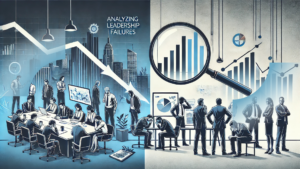AI-powered leadership is transforming organizations by empowering leaders to make smarter decisions, foster innovation, and improve operational efficiency. Leveraging the collaboration between artificial intelligence and human intelligence, leaders gain instant insights into customer behaviour, market shifts, and internal dynamics, enabling swift adaptation and proactive business strategies. This shift enables a more tailored customer experience, customer engagement, streamlines supply chains, and automates process driven repetitive routine tasks, freeing up resources for strategic tasks and priorities that requires more “thinking” and “feeling” type human capabilities and emotional intelligence. .
AI-led leadership cultivates an agile culture where data and metrics-driven insights enable proactive risk management and uncover new and alternative business growth avenues. Ultimately, this approach propels profitable growth, sustainable actions, and resilience, positioning businesses to succeed in an increasingly complex, fast-evolving and competitive landscape.
#IT Industry – In IT, AI-powered leadership accelerates product innovation and optimizes resource distribution. Leaders leverage AI to handle vast datasets, forecast infrastructure requirements, and automate development of IT artifacts, platforms and solutions, improving both speed and service quality. Predictive analytics ensures application and infrastructure uptime, strengthens data security, and controls costs, enabling leaders to keep pace with evolving technology changes and customer demands.
#BFSI (Banking, Financial Services, and Insurance) – AI-driven leadership in BFSI spurs advancements in fraud detection, risk management, and customer service. Leaders leverage AI to examine vast financial data, conduct precise risk assessments, detect fraud in real time, and tailor banking services. With chatbots and AI insights, leaders boost client interactions, streamline operations, and ensure regulatory compliance, enhancing trust and customer satisfaction.
Private Equity – In private equity, AI enhances due diligence, investment analysis, and portfolio oversight. AI insights help leaders identify lucrative investment opportunities and assess risks with precision. Predictive analytics enables leaders to anticipate market trends, streamline operations within portfolio companies, and make informed investment decisions that drive value.
Management Consulting – AI-powered leadership in management consulting elevates the ability to deliver actionable insights and data-driven strategies to clients. Leaders use AI to analyse complex data, forecast industry trends, and evaluate organizational performance, allowing for more personalized, high-impact recommendations. AI tools led by natural language processing and LLMs simplify research and benchmarking, enabling consulting leaders to provide scalable, innovative solutions to clients across various sectors.
#Industrial Sector – AI-powered leadership in the industrial sector is vital for digital transformation of manufacturing processes, enhancing supply chain efficiency, implementing intelligent automation and adopting circular economy by minimizing waste. Leaders employ AI-driven predictive maintenance to avoid expensive downtimes by anticipating equipment failures. AI driven automation also reduces energy use and boosts quality control, helping leaders achieve scalable production while controlling costs and environmental impact.
#Healthcare – In healthcare, AI-powered leadership revolutionizes patient care, diagnostics, and workflow management. Leaders use AI to analyse patient data for early diagnosis, customize treatments, and automate administrative tasks, improving efficiency and reducing human error. Predictive models support better patient outcomes, optimize resource allocation, and enable a faster response to public health needs, driving more effective and accessible healthcare.
In summary, leaders that leverage collaborative artificial intelligence along with human intelligence responsibly and optimally in their respective enterprises achieve both efficiency and effectiveness in their business functions including operations and marketing; thereby gaining competitive advantage in the market place.





